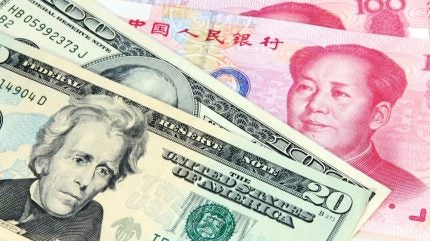
Since its introduction in January, the BIOSECURE Act has sent shockwaves across the pharmaceutical sector.
Although the Act does not propose a blanket prohibition, its definition of prohibiting federal funding for “biotechnology equipment or service” from a “biotechnology company of concern”, has raised concerns about the Act’s impact on collaborations with Chinese companies in particular. Specifically, the prohibition of the purchase of equipment or contracting services from Chinese companies like WuXi AppTec and WuXi Biologics, using US federal funds, has come under the spotlight. Many small and large pharmaceutical companies depend on federal grants, through the US National Institutes of Health (NIH) and the US Department of Defence, to finance their clinical programmes.

Discover B2B Marketing That Performs
Combine business intelligence and editorial excellence to reach engaged professionals across 36 leading media platforms.
The Act also leaves room to include other to-be-identified entities that are subject to the control of a “foreign adversary”, namely China, North Korea, Iran, Cuba, and Russia.
In an exclusive interview with Pharmaceutical Technology, Anshul Mangal, President of Project Farma, a consulting firm specialising in manufacturing and technical operations for complex biologics and novel therapies, talks about the impact of BIOSECURE Act on pharmaceutical companies and outlines the steps the companies can take to mitigate its impact.
This interview has been edited for length and clarity.
Phalguni Deswal [PD]: Following the provisions of the BIOSECURE Act, are there any alternatives to using China-based contract development and manufacturing organisations (CDMOs)?
Anshul Mangal [AM]: Pharma companies prefer Chinese CDMOs like WuXi as they are cost-effective and efficient. That is a big driver for reliance on these CDMOs. A recent survey by the US trade association BIO found that 79% of the 124 US companies surveyed had at least one contract or product with a China-based or Chinese-owned manufacturer. The Chinese CDMO industry has evolved to a point that no other country comes close.

US Tariffs are shifting - will you react or anticipate?
Don’t let policy changes catch you off guard. Stay proactive with real-time data and expert analysis.
By GlobalDataIndia offers an interesting alternative, as the costs there could be similar to China. I have heard that Indian CDMOs like Syngene International, Cipla and Aurobindo, are getting more calls from US-based entities as potential alternatives to Chinese CDMOs. There are also US-based alternatives, especially for cell and gene therapies, like the Center for Breakthrough Medicines, Catalant, and Lonza. However, the companies need to be cautious while switching CDMOs, as the process is costly, requires manpower and you may not get the same results.

The BIOSECURE Act has set a deadline of 1 January 2032 for US biopharma companies to end their contracts with these Chinese companies. So, we have a bit of time and it is possible to scale up in the eight-year period. But I have been urging all our clients to start making backup plans and think about your exit strategies. Companies need to figure out what the CDMO costs may be, both in the short term and the long term, and at what point you may want to structure alternative CDMO.
Early planning can be advantageous, as the Indian or other low-cost CDMO markets may not have a large-scale capacity, but if you contract to them early, they may scale up and can provide a good low-cost solution long term.
PD: The US Congressional Budget Office (CBO) has said the bill will not increase the federal debt as “the goods and services substitutes at a comparable price”. Do you think that alternatives to companies like WuXi can provide these services at a comparable cost?
AM: It depends. For certain drugs, there may be other alternatives at a similar cost. For others, there may not be any alternatives at the same cost at all. I do not think you are going to be able to find other comparable firms at the same cost level, especially if you are looking at the US or European CDMO market.
The CDMO services provided by the Chinese firms are offered at the lowest cost whilst having nice margins. If the US biotech firms switch to European or US-based CDMOs, it will increase the cost of drug development, at least in the short term. Although low-cost markets like India may offer comparable prices, it will take time for the Indian CDMO market to mature into what is being offered currently in China.
PD: Will the BIOSECURE Act affect the drug approval process if the companies prepare data packages using data collected by Chinese CDMOs?
AM: It may not affect the drug’s approval, depending on the phase of drug development. Companies may have ample time to do business with a company like WuXi and get the drug approved if they are in late Phase II or Phase III development. Even the therapies in Phase I can get approved in the US whilst using Chinese CDMOs to manufacture their products. So, the Act should not impact US drug approvals in the short term.
In the long term, say if you are a company looking to start a Phase I trial, four to five years down the line, you would be foolish to not look at other CDMOs or move manufacturing in house. Because if you are working up against the deadline with your clinical trials running into 2032, then you may not get your product made in China and face approval delays.
Even if a company that has a US-approved drug uses WuXi for manufacturing, it would need to find alternative suppliers to ensure commercial supply of the drug.
PD: How can companies mitigate the impact of the BIOSECURE Act?
AM: If a pharma company is contracting with a Chinese company, they need to make sure that they have termination rights and technology transfer provisions. They should have multiple vendors that can supply materials in the event a Chinese company or foreign suppliers came to be listed as a biotech company of concern under the BIOSECURE Act.
The same concerns apply to both large pharma players and small-to-mid-sized biotechs. A large pharma company may have the means to incur higher costs for a European or US CDMO. They may also have the financial means to build in-house manufacturing, instead of relying on any CDMO.
Small-to-mid-sized biotech companies may not have as much flexibility or capital as a large pharma company that has deeper pockets to invest in their manufacturing. So, they probably have to contract a CDMO to ensure product supply.
Due to the BIOSECURE Act, the pharma industry in general is shying away from Chinese CDMOs. Pharma companies are concerned that other Chinese companies may be added to the Act later. If a company is working with a Chinese CDMO, it would behove them to ensure that they have identified other alternatives. A company should have an identified backup plan with a non-Chinese CDMO if, for some reason, their Chinese CDMO gets named in the Act in the future.
Furthermore, companies should constantly monitor the Act and talk to others in the field to see how they are interpreting it and understand the measures they are taking to protect themselves in the future. The Act has bipartisan support and has gotten to a fairly mature state. So, no matter how the US election turns out, the Act is expected to pass in fairly the same flavour that it is now.




